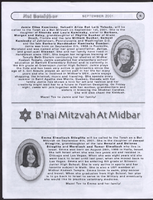Search the Special Collections and Archives Portal
Search Results

Transcript of interview with Gus Mancuso by Lisa Gioia-Acres, September 27, 2008
Date
Archival Collection
Description
Text
Marguerite and Jack Wagner Photograph Collection
Identifier
Abstract
The Marguerite and Jack Wagner Photograph Collection, approximately 1949 to 1970, consists of black-and-white photographic prints and negatives depicting the Wagner Motor Company automobile dealership in Las Vegas, Nevada. Included are images of Wagner posing with customers in front of automobiles.
Archival Collection

Micheal Miller interview, April 5, 1976: transcript
Date
Archival Collection
Description
On April 5, 1976, collector Broderick T. Ackerman interviewed Michael Miller who has lived in Nevada since 1910. In this interview, Mister Miller speaks about his time working on ranches and as a trapper in Northern Nevada. He also speaks about his time running nightclubs in Las Vegas, Nevada, as well as seeing much growth throughout his time living in Las Vegas.
Text

Transcript of interview with Rosina Goodwin by Bruce Eubank, March 15, 1978
Date
Archival Collection
Description
On March 15, 1978, Bruce Eubank interviewed Rosina Goodwin (born 1918 in Sweet Springs, Missouri) about her life in Las Vegas, Nevada. Goodwin first talks about her family background before discussing the Las Vegas Strip, the Stewart Ranch, and Twin Lakes. She also talks about schools, Boulder Dam, the atomic testing, and her work as a telephone operator. The latter part of the interview includes discussion on changes in Las Vegas, the Helldorado Parade, and changes in weather.
Text

Gwen Weeks Rahner interview, March 06, 1981: transcript
Date
Description
On March 6, 1981, Laronda D. Tinsley interviewed Gwendolyn Weekes Rahner (born August 14th, 1923 in Atlantic City, New Jersey) at her home in Las Vegas, Nevada. In this interview, Mrs. Rahner discusses working in politics and registering people to vote in Las Vegas, Nevada. She also discusses living in West Las Vegas and her experiences there.
Text

Transcript of interview with Bert Hood by Dennis McBride, June 16, 1998
Date
Archival Collection
Description
Bert Hood is celebrated in Las Vegas's gay history for his ownership of the Red Barn, one of our most famous gay bars. This is another of those serendipitous interviews I've conducted with someone I very much wanted to interview but didn't know how to find. Bert's in Las Vegas from Oklahoma City for just a short while visiting old friends, and I was lucky enough to have found him through Bill Schafer, president of the Southern Nevada Gay and Lesbian Historical Society. I want to thank you, Bert, for donating these two hours of your vacation time to me so I can preserve your stories for the gay community.
Text

Transcript of interview with Vivian Harwell by Pamela Atkins, February 27, 1979
Date
Description
On February 27th, 1979, Pamela Atkins interviewed Vivian Harwell in Las Vegas, Nevada. Harwell begins the interview by explaining her reasons for moving to Las Vegas from Arkansas, and the type of living quarters that she had. She then goes on to talk about the recreation in Las Vegas in addition to the Nevada Test Site and local politics. The two later discuss the convenience of having local colleges available in Las Vegas and the availability of children’s activities in Las Vegas. The interview concludes with Harwell’s personal reflection on her time living in Las Vegas, and that she does not regret moving to Las Vegas.
Text

